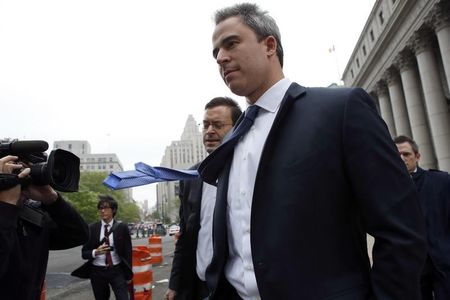By Nate Raymond NEW YORK (Reuters) - U.S. judges are imposing increasingly long prison terms for insider trading, a Reuters analysis shows. The rise is at least partly driven by the bigger profits being earned through the illegal schemes, defense lawyers said.
The trend is likely to continue on Monday when former SAC Capital Advisors manager Mathew Martoma is sentenced for what prosecutors have called the most lucrative insider trading case ever brought.
In the five-year period ending December 2013, insider trading defendants received an average sentence of 17.3 months, up from 13.1 months during the previous five years, or a 31.8 percent increase, the analysis of 207 insider trading sentences shows. Cases that were reversed on appeal were excluded from the study.
The number of cases has increased, with 57 percent of the sentences imposed in the past five years. The last three years alone have seen two record sentences.
In 2011, former billionaire and Galleon Group hedge fund founder Raj Rajaratnam received an 11-year sentence for an insider trading scheme that netted him $63.8 million in illicit profits. That was topped a year later when a New Jersey judge issued a 12-year term on Matthew Kluger, a former corporate lawyer accused of providing illegal tips in a $37 million scheme.
The uptick in big cases partly reflects a wave of prosecutions led by Manhattan U.S. Attorney Preet Bharara. Since October 2009, his office has charged 89 people with insider trading and secured 81 convictions.
"The judges have seen a rash of these cases, so it may be there is a sense that harsher punishments are needed," said Paul Shechtman, a defense lawyer with Zuckerman Spaeder who has been involved in insider trading cases.
Federal judges have discretion to impose any sentence, though they are required to consider advisory guidelines set by the U.S. Sentencing Commission. Within the judiciary, opinions vary, with some judges saying that harsher sentences are important to act as a deterrent and others saying the punishments are greater than the crimes.
Bharara himself has pushed for tougher sentences, urging the commission to revise its guidelines to provide for higher penalties for insider traders who use particularly complex or sophisticated means to execute their schemes.
"Based on our experience, the nature and scope of insider trading activity has evolved substantially, but the guidelines have not completely kept up," he testified in 2011 before the commission.
The commission adopted changes that went into effect in November 2012 that among other things increased sentences for schemes in which defendants make calculated or repeated efforts to trade on inside information.
It is not clear if Bharara's push for tougher sentences or the revised guidelines have had an impact on the length of sentences.
It had already been rising because of the scale of the profits reaped through insider trading, defense lawyers say.
CONVICTED IN FEBRUARY
On Monday, a federal judge in New York will weigh whether to impose what could be a record insider trading sentence on Martoma, a former fund manager at Steven A. Cohen's SAC.
A jury convicted Martoma, 40, in February of engaging in insider trading that enabled SAC to make profits and avoid losses of $275 million.
SAC last year pleaded guilty to insider trading and agreed to $1.8 billion in criminal and civil settlements.
Ahead of Martoma's sentencing, the court's probation department calculated that under the sentencing guidelines, he could receive almost 20 years, a figure based in large part on the size of the fraud.
The sentencing guidelines for insider trading rely heavily on the size of the gain resulting from the crime, allowing for the offense level to be graded higher based on a points system. The higher the points, the higher the suggested sentence. For example, because Martoma recorded a gain of more than $200 million his total points score reaches 36. The guidelines suggest this could mean a sentence of 188-235 months for a first-time offender.
Martoma's lawyers in a court filing called the nearly 20-year figure "outrageous." And the probation department ultimately recommended an eight-year sentence.
Prosecutors have told U.S. District Judge Paul Gardephe they are not opposed to a prison term below the guideline range, though they said that the probation department's recommended sentence is too short.
Even an eight-year term would be the sixth longest sentence for insider trading since 2004, the Reuters data shows.
BIG MONEY
The sentencing guidelines' reliance on gains and losses in white-collar cases have prompted defense lawyers and even some judges to press for changes.
Critics say the emphasis on profits fails to take into account a defendant's intent and role in the scheme.
One critic of the guidelines has been U.S. District Judge Jed Rakoff in Manhattan, who in 2012 sentenced former Goldman Sachs Group Inc director Rajat Gupta for insider trading.
Under the guidelines, Gupta faced eight years because Galleon Group made $5 million based on a tip prosecutors said Gupta gave to Rajaratnam.
Rakoff sentenced him to just two years, saying the guidelines' reliance on the monetary gains "effectively guaranteed that many such sentences would be irrational on their face."
Not every judge thinks that way. U.S. District Judge Richard Sullivan, who sits in the same court as Rakoff and has issued seven of the 11 longest insider trading sentences during Bharara's tenure, has said he does not share his colleague's sentiments.
"I think anyone who engages in this kind of conduct for the amounts of money that are involved here has to be on notice that they're going to be looking at a lengthy jail term," Sullivan said in sentencing a hedge fund manager, Anthony Chiasson, in 2013 to 6-1/2 years in prison.
In Martoma's case, prosecutors argued in court filings that if penalties are not steep enough, "a trader may determine that an opportunity to make illegal profits in the hundreds of millions may be worth the relatively low risk of getting caught and serving a short sentence of imprisonment."
Martoma's lawyers countered in court papers that an eight-year sentence would not take into account personal factors, such as the impact it would have on his wife and three children.

"Mr. Martoma is not perfect, but he is a good man," they wrote.
(Reporting by Nate Raymond in New York; Editing by Noeleen Walder, Amy Stevens and Martin Howell)
